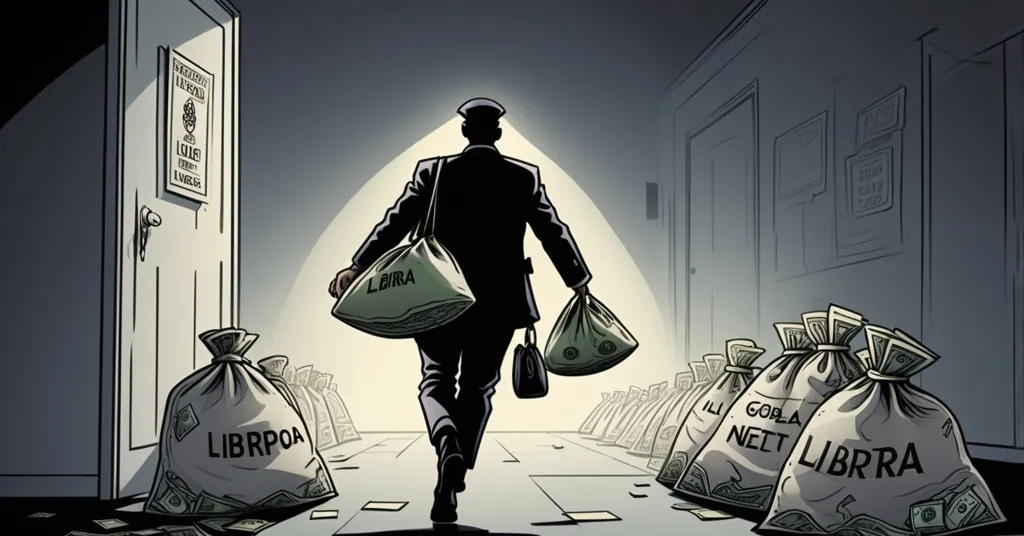Argentina Requests Interpol Red Notice for LIBRA Creator Hayden Davis Amid Scam Allegations

Argentina’s Legal Pursuit of LIBRA Token Creator Hayden Davis Heats Up
Argentina’s legal authorities are aggressively pursuing Hayden Davis, the mastermind behind the LIBRA token, following allegations of investor deception that have resulted in significant financial losses. Attorney Gregorio Dalbón, on behalf of the affected investors, has requested an Interpol Red Notice, which could lead to Davis’s international arrest and extradition.
- Interpol Red Notice sought for LIBRA token creator Hayden Davis
- Attorney Gregorio Dalbón represents affected investors
- President Javier Milei’s endorsement fueled LIBRA’s initial popularity
- Davis denies scam allegations, claims project simply failed
- $100 million remains in Davis’s control
- Alleged payments to Karina Milei for promotion, denied by both Milei siblings
- LIBRA’s collapse raises “rug pull” scam suspicions
- Ongoing legal action with potential for Davis’s arrest
The Rise of LIBRA: From Endorsement to Boom
The LIBRA token, once a beacon of hope for crypto enthusiasts, saw its value rapidly increase to reach a $4.4 billion total worth. This meteoric rise was significantly fueled by an endorsement from President Javier Milei, who posted about LIBRA on social media. In Argentina, where economic volatility has driven many to seek alternatives to traditional finance, such high-profile endorsements can drive massive interest in cryptocurrencies. However, Milei later deleted his endorsement, asserting no direct involvement with the project.
Argentina’s cryptocurrency landscape, marked by significant adoption but a lack of stringent regulations, has become a breeding ground for both innovation and scams. The LIBRA token’s popularity was a testament to the potential of cryptocurrencies to capture public imagination, but it also highlighted the risks of investing in unregulated digital assets.
The Fall: Allegations and Losses
In February 2025, the LIBRA token experienced a devastating 95% plummet, resulting in an estimated $251 million in losses for investors. This collapse led to accusations of a “rug pull” scam, where developers abandon a project and run away with investors’ money. Attorney Gregorio Dalbón asserts that Davis played a central role in the token’s downfall.
Davis, however, refutes these allegations, stating that the project was legitimate but ultimately unsuccessful. “Davis has refuted the allegations of a scheme, asserting that the project was unsuccessful but never intended to dupe investors,” he claims, drawing a clear distinction between failure and fraud. Yet, with around $100 million still under his control, skepticism persists.
The controversy deepened with allegations that Davis paid Karina Milei, the president’s sister, to promote LIBRA. Both Karina and President Javier Milei have vehemently denied these claims, adding a political dimension to the already complex situation.
Legal Battles: The Pursuit of Justice
The legal pursuit of Davis has intensified with Attorney Gregorio Dalbón’s request for an Interpol Red Notice. An Interpol Red Notice is a global alert to law enforcement to locate and arrest a person pending extradition, surrender, or similar legal action. If granted, this notice could lead to Davis’s arrest in any country that recognizes the warrant, potentially resulting in his extradition to Argentina.
The involvement of a national leader and his family members in this saga raises questions about political influence and corruption. The LIBRA scandal has not only caused financial losses but also significantly undermined investor trust in the cryptocurrency market in Argentina. This case serves as a stark reminder of the risks associated with investing in non-regulated cryptocurrencies, particularly when influenced by high-profile endorsements.
Broader Implications: The Future of Crypto Regulation
The LIBRA scandal is not merely a cautionary tale of a failed crypto project; it’s a wake-up call for the entire cryptocurrency industry. It underscores the urgent need for more robust investor protections and regulatory frameworks in the digital asset space. Experts emphasize the importance of stricter regulations in Argentina to prevent scams and protect investors, as well as laws requiring public officials to disclose their investments before endorsing financial products.
The case also highlights the challenges of enforcing international law in the cryptocurrency space, given its decentralized and global nature. The potential arrest of Davis through an Interpol Red Notice could set a precedent for how global law enforcement tackles cryptocurrency-related crimes. As the crypto community watches closely, the outcome of this case could shape the future of digital asset regulation and investor protection for years to come.
Key Takeaways and Questions
- What is an Interpol Red Notice?
An Interpol Red Notice is a request to law enforcement worldwide to locate and provisionally arrest a person pending extradition, surrender, or similar legal action.
- What role did Javier Milei play in the LIBRA token’s popularity?
Javier Milei, the President of Argentina, endorsed LIBRA via a social media post, which contributed to its initial popularity and attracted a large number of investors.
- What are the allegations against Hayden Davis?
Hayden Davis is accused of deceiving investors through the LIBRA token, which led to significant financial losses, with allegations suggesting a possible “rug pull” scam, where developers abandon a project and run away with investors’ money.
- How has Davis responded to the allegations?
Davis has denied any fraudulent intent, stating that the LIBRA project failed but was never intended to scam investors.
- What is the potential impact of an Interpol Red Notice on Davis?
If granted, an Interpol Red Notice could lead to Davis’s arrest in any country that recognizes the warrant, potentially resulting in extradition to Argentina to face legal action.



